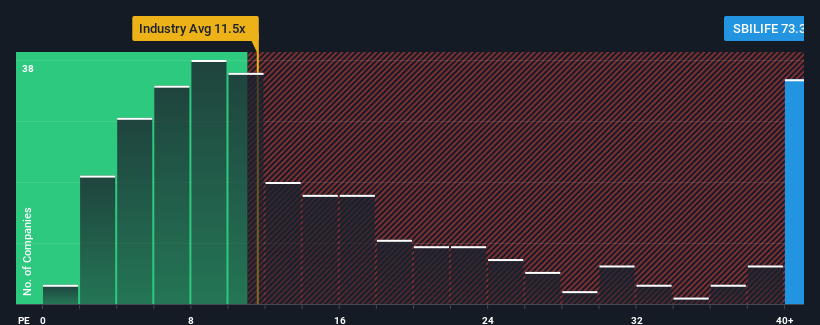SBI Life Insurance Company Limited's (NSE:SBILIFE) Share Price Could Signal Some Risk

With a price-to-earnings (or "P/E") ratio of 73.3x SBI Life Insurance Company Limited (NSE:SBILIFE) may be sending very bearish signals at the moment, given that almost half of all companies in India have P/E ratios under 30x and even P/E's lower than 17x are not unusual. Although, it's not wise to just take the P/E at face value as there may be an explanation why it's so lofty.
With earnings growth that's inferior to most other companies of late, SBI Life Insurance has been relatively sluggish. One possibility is that the P/E is high because investors think this lacklustre earnings performance will improve markedly. You'd really hope so, otherwise you're paying a pretty hefty price for no particular reason.
View our latest analysis for SBI Life Insurance

What Are Growth Metrics Telling Us About The High P/E?
There's an inherent assumption that a company should far outperform the market for P/E ratios like SBI Life Insurance's to be considered reasonable.
Taking a look back first, we see that the company managed to grow earnings per share by a handy 10% last year. The latest three year period has also seen a 30% overall rise in EPS, aided somewhat by its short-term performance. Therefore, it's fair to say the earnings growth recently has been respectable for the company.
Turning to the outlook, the next three years should generate growth of 15% per year as estimated by the analysts watching the company. With the market predicted to deliver 21% growth per annum, the company is positioned for a weaker earnings result.
With this information, we find it concerning that SBI Life Insurance is trading at a P/E higher than the market. It seems most investors are hoping for a turnaround in the company's business prospects, but the analyst cohort is not so confident this will happen. Only the boldest would assume these prices are sustainable as this level of earnings growth is likely to weigh heavily on the share price eventually.
The Bottom Line On SBI Life Insurance's P/E
It's argued the price-to-earnings ratio is an inferior measure of value within certain industries, but it can be a powerful business sentiment indicator.
We've established that SBI Life Insurance currently trades on a much higher than expected P/E since its forecast growth is lower than the wider market. When we see a weak earnings outlook with slower than market growth, we suspect the share price is at risk of declining, sending the high P/E lower. This places shareholders' investments at significant risk and potential investors in danger of paying an excessive premium.
It's always necessary to consider the ever-present spectre of investment risk. We've identified 1 warning sign with SBI Life Insurance, and understanding should be part of your investment process.
If P/E ratios interest you, you may wish to see this free collection of other companies with strong earnings growth and low P/E ratios.
New: Manage All Your Stock Portfolios in One Place
We've created the ultimate portfolio companion for stock investors, and it's free.
• Connect an unlimited number of Portfolios and see your total in one currency
• Be alerted to new Warning Signs or Risks via email or mobile
• Track the Fair Value of your stocks
Have feedback on this article? Concerned about the content? Get in touch with us directly. Alternatively, email editorial-team (at) simplywallst.com.
This article by Simply Wall St is general in nature. We provide commentary based on historical data and analyst forecasts only using an unbiased methodology and our articles are not intended to be financial advice. It does not constitute a recommendation to buy or sell any stock, and does not take account of your objectives, or your financial situation. We aim to bring you long-term focused analysis driven by fundamental data. Note that our analysis may not factor in the latest price-sensitive company announcements or qualitative material. Simply Wall St has no position in any stocks mentioned.
About NSEI:SBILIFE
SBI Life Insurance
Operates as a private life insurance company in India.
Solid track record with excellent balance sheet.
Similar Companies
Market Insights
Community Narratives



